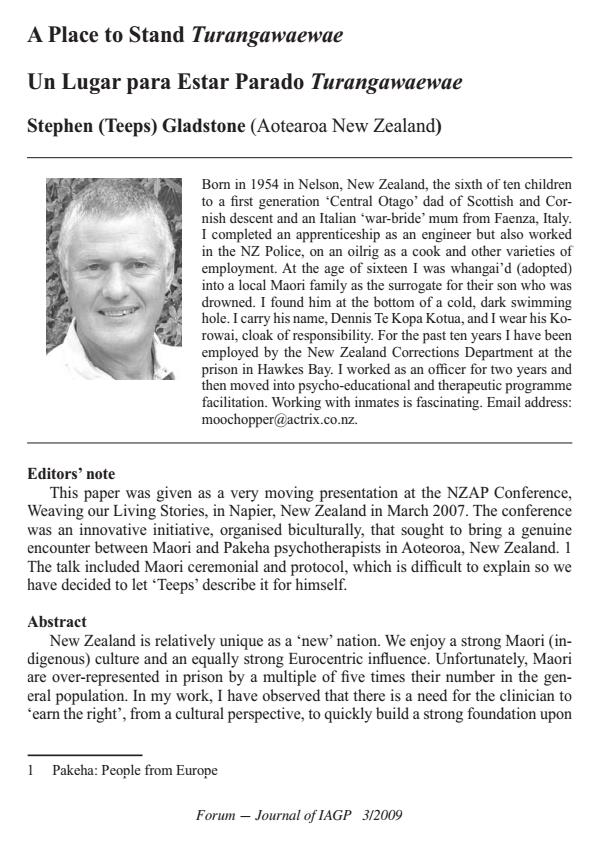A Place to Stand Turangawaewae
Journal title FORUM
Author/s Stephen (Teeps) Gladstone
Publishing Year 2009 Issue 2009/3
Language Italian Pages 10 P. 145-154 File size 127 KB
DOI 10.3280/FORU2009-002012
DOI is like a bar code for intellectual property: to have more infomation
click here
Below, you can see the article first page
If you want to buy this article in PDF format, you can do it, following the instructions to buy download credits

FrancoAngeli is member of Publishers International Linking Association, Inc (PILA), a not-for-profit association which run the CrossRef service enabling links to and from online scholarly content.
A Place to Stand Turangawaewae - New Zealand is relatively unique as a ‘new’ nation. We enjoy a strong Maori (indigenous) culture and an equally strong Eurocentric influence. Unfortunately, Maori are over-represented in prison by a multiple of five times their number in the general population. In my work, I have observed that there is a need for the clinician to ‘earn the right’, from a cultural perspective, to quickly build a strong foundation upon for the clinician to indicate to the client that he (or she) understands the dynamics and values of Maori Culture because they run parallel to the dynamics and values of the clinical practice. It is best explained as follows: Maori will always identify and define themselves by reciting their geographical and familial factors by naming their: Mountain (Maunga), the most significant feature of the landscape River (Awa), which supports all life Canoe (Waka), in which their ancestors travelled here hundreds of years ago Locality (Marae), where local people and guests gather Meeting House (Whare Tupuna), where the ethos of the ancestors is tangible Tribe (Iwi), the larger group which can often be scattered, but united Family (Hapu), their immediate family and support. As a Clinician I arrived at the following understandings: Mountain is their Therapeutic Foundation (Cognitive, Behaviourism, Gestalt or a blending of various disciplines). River is the flow of therapeutic models and knowledge they employ in their practice. Canoe is the means of their learning, e.g. University, school etc. Locality is their place of practice. Meeting House is their Therapeutic Environment wherein abide the ancestors of their practice. Tribe is their therapeutic community, which could be international. Family are those with whom they are closely aligned in practice and supervision.
Stephen (Teeps) Gladstone, A Place to Stand Turangawaewae in "FORUM" 3/2009, pp 145-154, DOI: 10.3280/FORU2009-002012